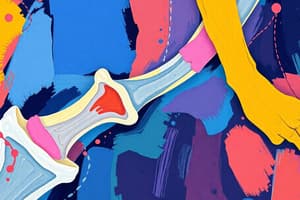Podcast
Questions and Answers
What are common causes of fluid excess in the body?
What are common causes of fluid excess in the body?
- Severe dehydration
- Increased intake of fluids (correct)
- Renal failure (correct)
- Excessive vomiting
Which clinical manifestation is typically associated with hyperkalemia?
Which clinical manifestation is typically associated with hyperkalemia?
- Jaundice
- Increased urination
- Bradycardia (correct)
- Muscle cramps
What is the primary priority intervention for a patient experiencing a new GI bleed?
What is the primary priority intervention for a patient experiencing a new GI bleed?
- Monitor vital signs
- Provide IV fluids (correct)
- Initiate a diet plan
- Administer pain medications
Which of the following medications should be avoided in a patient with peptic ulcer disease?
Which of the following medications should be avoided in a patient with peptic ulcer disease?
What is a distinguishing feature of Crohn's disease compared to Ulcerative Colitis?
What is a distinguishing feature of Crohn's disease compared to Ulcerative Colitis?
What is a common complication of osteomyelitis?
What is a common complication of osteomyelitis?
Which of the following interventions should a nurse take for a patient showing signs of compartment syndrome?
Which of the following interventions should a nurse take for a patient showing signs of compartment syndrome?
Which medication is commonly prescribed for pain management after surgery?
Which medication is commonly prescribed for pain management after surgery?
What is a key sign of sleep deprivation?
What is a key sign of sleep deprivation?
Which of the following is a sign of low albumin levels in a patient?
Which of the following is a sign of low albumin levels in a patient?
Which type of feeding method is most appropriate for a patient unable to consume food orally for an extended period?
Which type of feeding method is most appropriate for a patient unable to consume food orally for an extended period?
What is the role of informed consent in the surgical setting?
What is the role of informed consent in the surgical setting?
What should a nurse educate a patient about regarding smoking cessation preoperatively?
What should a nurse educate a patient about regarding smoking cessation preoperatively?
Flashcards
Fluid Imbalance Types
Fluid Imbalance Types
Fluid imbalances occur when there's too little or too much fluid in the body. Types include hypovolemia (low volume), hypervolemia (high volume), and imbalances in electrolytes like sodium and potassium.
Hyperkalemia Treatment
Hyperkalemia Treatment
Treatment for high potassium (hyperkalemia) focuses on rapidly lowering potassium levels. This often involves medications and possibly dialysis.
Chronic Kidney Disease (CKD) Labs
Chronic Kidney Disease (CKD) Labs
Kidney function is measured through labs like creatinine & BUN. In CKD these labs get progressively elevated as kidney function worsens.
AKI Causes
AKI Causes
Signup and view all the flashcards
Incontinence Types
Incontinence Types
Signup and view all the flashcards
Fracture Types
Fracture Types
Signup and view all the flashcards
Osteoporosis
Osteoporosis
Signup and view all the flashcards
Osteomyelitis
Osteomyelitis
Signup and view all the flashcards
Post-op ORIF complication
Post-op ORIF complication
Signup and view all the flashcards
Pre-op Patient Education
Pre-op Patient Education
Signup and view all the flashcards
Post-op Complications (Pneumonia, DVT)
Post-op Complications (Pneumonia, DVT)
Signup and view all the flashcards
Refeeding Syndrome
Refeeding Syndrome
Signup and view all the flashcards
Sleep Apnea Treatments
Sleep Apnea Treatments
Signup and view all the flashcards
Study Notes
Bone Disorders
- Types of fractures (matching)
- Osteoporosis
- Osteomyelitis
- Gout
- Compartment Syndrome
- Deep vein thrombosis (DVT)
- Rhabdomyolysis
- Post-operative ORIF patient case study (assessment of one-sided lower extremity pain and redness, complication identification, interventions, SBAR report)
Perioperative Care
- Patient education (pre-op, post-op, discharge instructions)
- Smoking cessation, concerning pre-op symptoms
- Post-op complications (pneumonia, DVTs)
- IV and oral medications for pain management
- Informed consent (surgery vs. surgeon visit)
Sleep
- Sleep apnea (signs, symptoms, treatments)
- Sleep deprivation (signs, symptoms)
- Sleep hygiene (best practices)
- Bonus: HR changes in age/fitness levels
Nutrition
- Nursing considerations for parenteral and enteral feedings
- Patient safety concerns
- Parenteral Nutrition (PPN) vs. Total Parenteral Nutrition (TPN) vs. Tube Feeds
- Metabolic Syndrome
- Lab values linked to nutritional status (signs/symptoms of low albumin levels)
- Refeeding syndrome
Skin
- Sunscreen guidance and recommendations
- Wound healing (smoking impact)
- Skin's role in general health
- Signs/symptoms of atopic dermatitis
Fluid and Electrolytes
- Differences between hypo/hyper/isotonic fluids
- Types of IV fluids (reference)
- Clinical manifestations and causes of hypo/hyper (reference)
- Treatment for hyperkalemia
- Causes of fluid deficit/excess (reference)
- Fluid imbalance (loss of fluid)
Renal
- Labs linked to kidney function (CKD)
- Causes of acute kidney injury (AKI)
- Stages of chronic kidney disease (CKD)
- Causes of uric acid kidney stones
- Medications for chronic kidney disease
- Contraindications for medications
- Assessment data for medication administration (labs, physical assessment)
GU
- Incontinence (differences/treatment/nursing considerations/interventions)
GI
- Lower vs. Upper GI bleeds (assessment findings, fluid volume deficit, priority interventions)
- Crohn's disease, ulcerative colitis, fistulas
- GI bleeds
- GERD (medications/treatments - H2 blockers and PPIs)
- Peritonitis (treatments)
- Peptic ulcer disease (medications, risk factors, causes)
- Case study (ADPIE application to abdominal pain)
- GI problem suspected
- Lab value expected to be elevated
Additional Information (from page 4)
- Diagnostic studies for pain cause
- Predicted interventions/treatments for a patient
- Anticipated complications if untreated
Studying That Suits You
Use AI to generate personalized quizzes and flashcards to suit your learning preferences.




